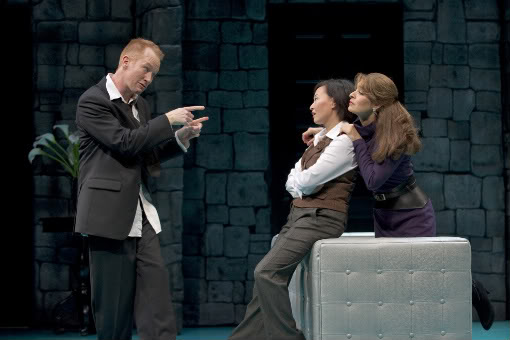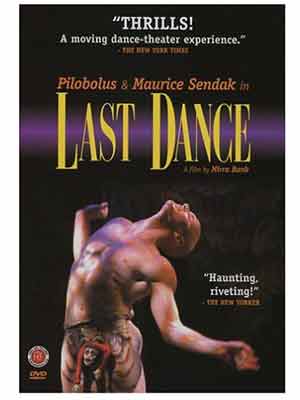“My toils in the quotation field have led me to formulate two or three laws about the way people use and abuse quotations. My first law is: When in doubt, ascribe all quotations to Bernard Shaw–which I don’t mean to be taken literally, but as a general observation of the habit people have of attaching remarks to the nearest obvious speaker.”
Nigel Rees, Sayings of the Century
Archives for June 2010
TT: Almanac
“I do not speak the minds of others except to speak my own mind better.”
Michel de Montaigne, “Of the Education of Children”
TT: Hamlet the hipster
I’ll be writing about the Oregon Shakespeare Festival this week and next in my Wall Street Journal drama column. Today I review two sharply contrasting shows, Hamlet and the West Coast premiere of Lynn Nottage’s Ruined, both of which are outstanding. Here’s an excerpt.
* * *
The first rule of theater is that there are no rules–other than not to be dull. Practice always trumps theory onstage, and nearly anything, no matter how absurd it may seem, can be made to work if it’s charged with conviction. Experience has taught me that lesson time and again, but I can still be taken by surprise when a show about which I’m understandably skeptical ends up being terrific. That happened with the Oregon Shakespeare Festival’s new “Hamlet,” which looked trendy on paper but turned out to be immensely exciting.
 Bill Rauch, the festival’s artistic director, goes in for up-to-the-second ideas, and his modern-dress staging of “Hamlet” is full of them. The setting is a contemporary castle equipped with swiveling security cameras and beefy guards who brandish assault weapons. Hamlet (Dan Donohue) is a flippant hipster decked out in sunglasses and skinny tie. Claudius (Jeffrey King) is a glib glad-hander who looks like Daddy Warbucks. Polonius (Richard Elmore) is the clueless father of a sitcom-style family. The Player King (Ramiz Monsef) is a rapper and Rosencrantz and Guildenstern (Vilma Silva and Jeany Park) are a cute lesbian couple.
Bill Rauch, the festival’s artistic director, goes in for up-to-the-second ideas, and his modern-dress staging of “Hamlet” is full of them. The setting is a contemporary castle equipped with swiveling security cameras and beefy guards who brandish assault weapons. Hamlet (Dan Donohue) is a flippant hipster decked out in sunglasses and skinny tie. Claudius (Jeffrey King) is a glib glad-hander who looks like Daddy Warbucks. Polonius (Richard Elmore) is the clueless father of a sitcom-style family. The Player King (Ramiz Monsef) is a rapper and Rosencrantz and Guildenstern (Vilma Silva and Jeany Park) are a cute lesbian couple.
Are you rolling your eyes yet? Well, stop it. Mr. Rauch’s “Hamlet” may sound like a cornucopia of postmodern clichés, but no sooner does it get moving than you find yourself swept up in the momentum of a show that makes compulsive sense. Every scene is shaped with easy authority and every line, even “To be or not to be,” is read with a freshness and snap that make it new. It helps–a lot–that the acting is so consistently strong, especially that of Mr. Donohue, who plays Hamlet as a soft-spoken, bristlingly intelligent neurotic who stoops to cheap irony because the situation in which he finds himself would otherwise be too hurtful to bear. But it is the directorial choices that give point to the performances of the cast…
Lynn Nottage and Oregon Shakespeare have close ties. In 2006 the company presented one of the first regional productions of “Intimate Apparel,” the Pulitzer-winning play that opened the eyes of many American theatergoers (myself among them) to Ms. Nottage’s great gifts. Now it’s giving the West Coast premiere of “Ruined,” her portrayal of the monstrous war of all against all that has consumed a generation of Congolese women….
Kate Whoriskey, who directed the original production of “Ruined,” is remounting it next month at Seattle’s Intiman Theatre. While I saw Ms. Whoriskey’s version Off Broadway in 2009 and was as impressed as it’s possible to be, OSF’s production, directed by Liesl Tommy on a three-quarter-round stage, is closely comparable in effect….
* * *
Read the whole thing here.
TT: Almanac
“How vain it is to sit down to write when you have not stood up to live.”
Henry David Thoreau, journal entry (Aug. 19, 1851)
TT: So you want to see a show?
Here’s my list of recommended Broadway, off-Broadway, and out-of-town shows, updated weekly. In all cases, I gave these shows favorable reviews (if sometimes qualifiedly so) in The Wall Street Journal when they opened. For more information, click on the title.
Warning: Broadway shows marked with an asterisk were sold out, or nearly so, last week.
BROADWAY:
• La Cage aux Folles (musical, PG-13, adult subject matter, reviewed here)
• Fela! (musical, PG-13, adult subject matter, reviewed here)
• Fences * (drama, PG-13/R, adult subject matter, closes July 11, reviewed here)
• Million Dollar Quartet (jukebox musical, G, reviewed here)
• South Pacific (musical, G/PG-13, some sexual content, brilliantly staged but unsuitable for viewers acutely allergic to preachiness, closes Aug. 22, reviewed here)
OFF BROADWAY:
• Alfred Hitchcock’s The 39 Steps (comedy, G, suitable for bright children, original Broadway production reviewed here)
• Avenue Q (musical, R, adult subject matter and one show-stopping scene of puppet-on-puppet sex, reviewed here)
• The Fantasticks (musical, G, suitable for children capable of enjoying a love story, reviewed here)
• Our Town (drama, G, suitable for mature children, reviewed here)
IN CHICAGO:
• The Farnsworth Invention (drama, G, too complicated for children, closes July 24, reviewed here)
• Killer Joe (black comedy-drama, X, extreme violence and nudity, closes July 18, reviewed here)
IN GLENCOE, ILL.:
• A Streetcar Named Desire (drama, PG-13, adult subject matter, closes July 18, reviewed here)
CLOSING SOON IN EAST HADDAM, CONN.:
• Annie Get Your Gun (musical, G, child-friendly, closes July 3, reviewed here)
CLOSING SOON IN PHILADELPHIA:
• Sunday in the Park with George (musical, PG-13, far too complex for children, closes July 4, reviewed here)
CLOSING NEXT WEEK OFF BROADWAY:
• That Face (drama, PG-13, not suitable for children, closes June 27, reviewed here)
TT: Almanac
“As well as a native, half-knavish wit, his was that careful mean shrewdness by which alone a man can climb, not too visibly soiled, through the sewer-like lower labyrinth of American politics.”
James Gould Cozzens, The Last Adam
TT: Jonathan Wolken, R.I.P.
 I’ve been a fan of Pilobolus Dance Theatre ever since I started to look at the dance, and my admiration deepened when I began writing about ballet and modern dance in 1990. From then on I had frequent occasion to write about Pilobolus, whose unique brand of theatrical trompe l’oeil is easy to describe but hard to explain, as I rediscovered time and again during my tenure as dance critic of the New York Daily News:
I’ve been a fan of Pilobolus Dance Theatre ever since I started to look at the dance, and my admiration deepened when I began writing about ballet and modern dance in 1990. From then on I had frequent occasion to write about Pilobolus, whose unique brand of theatrical trompe l’oeil is easy to describe but hard to explain, as I rediscovered time and again during my tenure as dance critic of the New York Daily News:
The lights go down, the curtain goes up, and six half-clothed dancers come running on stage and immediately start tying themselves into exotic knots and strange, almost-familiar shapes. Are you dreaming? Are you trapped inside a surrealist painting? No, you’re just watching Pilobolus Dance Theatre, a group so witty and imaginative that it has flourished for a quarter-century…
Pilobolus Dance Theatre is among the most popular and successful companies in the history of American dance. The members of Pilobolus have twisted themselves into indescribably kinky knots everywhere from the Edinburgh Festival to The Tonight Show and Sesame Street, accompanied by everything from bluegrass and rap to Corelli and Carmina Burana. Their wry, often light-hearted style–an eye-popping combination of dance, gymnastics and performance art–appeals not just to modern-dance buffs but to audiences of all kinds.
 I got to know Jonathan Wolken, one of the group’s founders, when I spent a couple of days watching Pilobolus audition new dancers at New York’s City Center, then wrote a piece for the New York Times about the experience. We hit it off, and a year later Jonathan and his colleagues allowed me to be a fly on the wall as they created a new dance in collaboration with Maurice Sendak. That unforgettable experience led not only to another piece for the Times, but to my appearing in Last Dance, Mirra Banks’ 2002 documentary about the creation of A Selection, the Pilobolus-Sendak dance that I’d seen being made three years earlier.
I got to know Jonathan Wolken, one of the group’s founders, when I spent a couple of days watching Pilobolus audition new dancers at New York’s City Center, then wrote a piece for the New York Times about the experience. We hit it off, and a year later Jonathan and his colleagues allowed me to be a fly on the wall as they created a new dance in collaboration with Maurice Sendak. That unforgettable experience led not only to another piece for the Times, but to my appearing in Last Dance, Mirra Banks’ 2002 documentary about the creation of A Selection, the Pilobolus-Sendak dance that I’d seen being made three years earlier.
I never got to know Jonathan more than casually–he was prickly and self-possessed in a way that I found intimidating–but I liked and admired him and was always pleased to chat with him about Pilobolus and its doings whenever the group was in town for one of its summer seasons at the Joyce Theater. Alas, the demands of my work as a drama critic forced me to spend less time attending dance performances, and so I was taken completely by surprise when I learned last night that Jonathan had died at the absurdly untimely age of sixty.
I find it hard to grasp that one of the founding members of a performing ensemble that has long been so much a part of my aesthetic life is no longer with us. The good news–if you can call it that–is that the dances that Jonathan helped to create, like Pilobolus itself, will survive him for a very long time to come. Even so, his death tears a hole in the world, one that for me is larger still because he was only six years my senior. I always thought of Jonathan Wolken as an elder statesman of dance. Somehow it never occurred to me that a mere half-generation separated us. The not-so-old order passeth….
* * *
Jonathan’s New York Times obituary is here.
TT: Snapshot
Patricia Neway sings “To this we’ve come” in a 1960 telecast of Gian Carlo Menotti’s The Consul, conducted by Werner Torkanowsky. Neway created the role of Magda Sorel in the opera’s original 1950 Broadway production:
(This is the latest in a weekly series of arts-related videos that appear in this space each Wednesday.)
